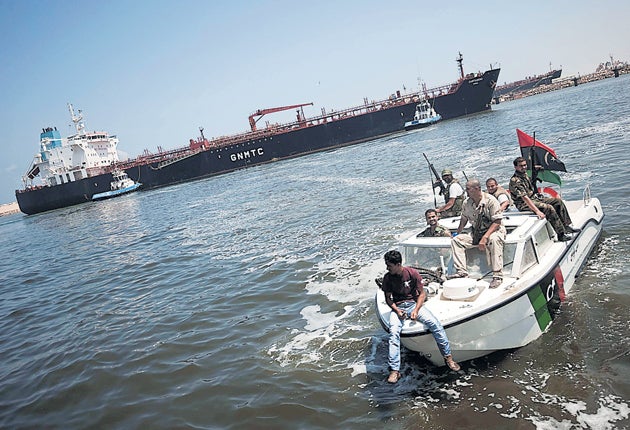Libyan tanker seized by rebels reaches Benghazi

Your support helps us to tell the story
From reproductive rights to climate change to Big Tech, The Independent is on the ground when the story is developing. Whether it's investigating the financials of Elon Musk's pro-Trump PAC or producing our latest documentary, 'The A Word', which shines a light on the American women fighting for reproductive rights, we know how important it is to parse out the facts from the messaging.
At such a critical moment in US history, we need reporters on the ground. Your donation allows us to keep sending journalists to speak to both sides of the story.
The Independent is trusted by Americans across the entire political spectrum. And unlike many other quality news outlets, we choose not to lock Americans out of our reporting and analysis with paywalls. We believe quality journalism should be available to everyone, paid for by those who can afford it.
Your support makes all the difference.A Libyan tanker reportedly seized by rebels opposing Muammar Gaddafi's regime on Tuesday night arrived in Benghazi yesterday after being cleared to proceed by Nato ships enforcing an arms embargo.
Sources familiar with the situation said the rebels seized the tanker Cartagena, which belongs to the Libyan government, off Malta. Nato forces then cleared the vessel to proceed, the sources said. A Nato spokesman declined to comment on a report in a petroleum industry newsletter, the Petroleum Economist, that the Cartagena was seized with the help of special forces from a European state.
The publication quoted "a source familiar with the operation" as saying a European government had given logistical support to the operation, which it said was believed to have involved special forces boarding the ship from the air. Colonel Roland Lavoie said earlier that "there were no such indications", but he gave no more details.
The vessel belongs to Libya's General National Maritime Transport Company, which is believed to be controlled by Colonel Gaddafi's son Hannibal, who is on a UN sanctions list and subject to an asset freeze and a travel ban.
The Petroleum Economist said the Cartagena was carrying almost 40,000 tonnes of gasoline. It said the ship was originally chartered to land the fuel in Tripoli and had been stranded in the Mediterranean after Nato began intercepting seaborne fuel supplies for Colonel Gaddafi in May.
While not specifically charged with enforcing a fuel embargo on Libya, Nato said in May it had intercepted an oil tanker which it said it had reason to believe was set to deliver fuel to Colonel Gaddafi's forces. It said then it would continue to do so on a case-by-case basis.
Join our commenting forum
Join thought-provoking conversations, follow other Independent readers and see their replies
Comments